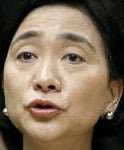In early September, three Hong Kong reporters covering unrest in Xinjiang were beaten by police. Blurred shots of the incident appeared on TV back in the Big Lychee, prompting righteous anger across the city’s political spectrum. Officials in Urumqi, surprised and miffed at this negative reaction, made up stories to give the impression that the journalists had brought it on themselves, even though it was clear to everyone here that they were nice decent kids who give up their seats to old ladies on the MTR, thus stirring even more outrage in China’s small but perfectly formed Land of the Free.
 Hong Kong’s leaders promised to have words with important people in Beijing. Meanwhile, our legislators decided to impose the ultimate sanction on whoever on the mainland was to blame: a non-binding motion. Pro-democracy legislator Emily Lau’s resolution failed to win enough votes in the Legislative Council yesterday either in her original version or in the sanitized form proposed by pro-Beijing lawmaker Dr the Hon Philip Wong. The whole thing, with all proposed amendments, is at the very bottom of the meeting’s riveting agenda. Here is the meat of it, with Emily’s bits that were arguably disrespectful to the Communist leadership crossed out and replaced (in italics) by whoever drafted Wong’s more calming, non-confrontational revision.
Hong Kong’s leaders promised to have words with important people in Beijing. Meanwhile, our legislators decided to impose the ultimate sanction on whoever on the mainland was to blame: a non-binding motion. Pro-democracy legislator Emily Lau’s resolution failed to win enough votes in the Legislative Council yesterday either in her original version or in the sanitized form proposed by pro-Beijing lawmaker Dr the Hon Philip Wong. The whole thing, with all proposed amendments, is at the very bottom of the meeting’s riveting agenda. Here is the meat of it, with Emily’s bits that were arguably disrespectful to the Communist leadership crossed out and replaced (in italics) by whoever drafted Wong’s more calming, non-confrontational revision.
Defending freedom of the press
Hon Emily LAU: (Translation)
That according to media reports, recently some Hong Kong journalists, while covering news in Xinjiang, were assaulted, handcuffed and detained by law enforcement officers, and even accused slanderously alleged by the local information office of inciting disturbance and violating the rules on news coverage; also, some Hong Kong journalists covering news in Sichuan were alleged by law enforcement officers of suspected possession of drugs and prohibited from going out; the above incidents have seriously undermined obstructed the freedom of news coverage and the public’s right to know as well as damaged affected the core values of freedom of the press; this Council condemns expresses grave concern about such acts and urges the Government to adopt the following measures:a) to solemnly reflect to the Mainland authorities the concerns of the press in Hong Kong that the Mainland authorities are expected to ensure that the law enforcement officers on the Mainland be requested to will respect civic rights and freedom of the press, refrain from illegally detaining, arresting or assaulting journalists, and request the Mainland authorities to impose severe punishment on the offenders and ensure that similar incidents will not happen again, in order to prevent such incidents from happening;
b) in regard to the unjust investigation of the abovementioned incidents and the slanderous serious accusation against journalists by the Mainland authorities in the abovementioned incidents, to request the Mainland authorities to make clarifications and apologies, conduct a just investigation afresh and release the investigation results to the public;
[drivel not worth amending]
The Hong Kong government obviously took it all very seriously, because they dragged some pro-Beijing lawmakers who rarely turn up into the chamber in order to defeat the original motion. What – if anything – is vaguely interesting is that the two versions are not that different. Emily’s hectoring polemic gets tossed out in favour of insipid and neutral phrases so as not to chastise the Central People’s Government. But the core of it – that local officials were out of line – is intact.
Which suggests that neither our pro-democracy nor pro-Beijing lawmakers seem to realize that there is no freedom of the press or rule of law over the border, and these great things are not transportable by those of us fortunate enough to take them for granted should we go up there. It’s enough to drive even the mildest and sweetest Xinjiang spokeswoman up the wall in exasperation.
